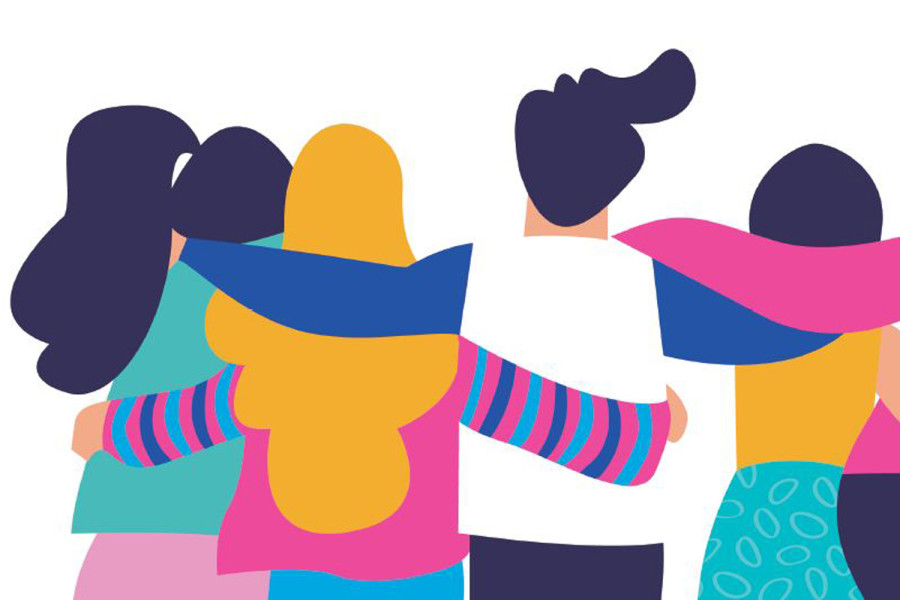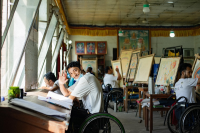Culture & Lifestyle
Why vulnerability is important in relationships
Vulnerability in emotions means connecting with the unpleasant feelings that surface because of our experiences—especially in relation to others.
Tashi Gurung
As a novice counsellor, I used to fear touching upon clients' emotions. We would talk about the rational part: the daily narrative—what was happening, where they were going, how their events were shaping up, but hardly any emotional content. And because I was hesitant, even the clients in front of me would find it difficult to open up.
My then supervisor had asked me a question, which remains in my mind to this day, "Do you think it is okay to have tears in your eyes when you are in a session?" My novice self could hardly comprehend that possibility: I was totally against it. I thought, 'How can I, as a counsellor and a therapist, be the one breaking down?' I used to wonder: doesn't that show inadequacy? Doesn't that mean I was weak when I should have been holding it together?
Now my current self wants to chide that younger version and assure him that it is okay to have tears in your eyes. It is also okay to break down. Human emotions are complex, and most times, being vulnerable with our emotions, i.e., connecting with them, can be therapeutic.
Vulnerability in emotions means connecting with the unpleasant feelings that surface because of our experiences – especially in relation to other people. We tend to give more weight and value to pleasant emotions such as excitement, delight, love and joy – whereas we tend to negate the unpleasant ones, such as guilt, remorse, anger, shame, grief and sorrow.
A very relevant example for this phenomenon is demonstrated by the movie Inside Out. This movie came out while I was in training, and I was surprisingly taken aback by its subtle message. Without divulging too much about the movie's details, it enforces the message that too much happiness can be toxic. In fact, sadness, no matter how uncomfortable, is equally essential in building a connection with people.
We can ask ourselves this question: How often have we been truly honest about how we feel with our loved ones? With our family? Friends? Partner or Spouse? Have we had a moment for a heart-to-heart and been truly vulnerable?
A major factor in answer to the question lies in our childhood experiences. Was I accepted for my emotions when I was upset, hurt, distressed, or angry when younger? Did my parents (and other significant elders) say it was okay? Did they make me feel validated? Or did they dismiss it? Did they tell me not to cry? To not be upset or angry and to stop feeling.
If our experiences lean more towards the latter, the answer to the above question about being truly vulnerable has a higher chance of being 'No'. When we are not allowed to feel as a child, we tend to dismiss our emotions as adults and others' emotions.
Being dismissive is where most of our conflicts with our loved ones originate. When our partner makes a joke to us, we might retaliate and attack. We might say, "How dare you say that to me!" or "You are such a fool". But at that moment, if we had become vulnerable, we might have responded, "Oh, that was hurtful" or "Hey, it's not funny to me, as it makes me feel humiliated".
Not only does vulnerability reduce conflict, it also helps us feel more connected and trusting of others. We truly get to know each other for the way that we are – all the deep-laden insecurities and emotions. Also, we develop the capacity to accept and cope with complicated feelings. The heavy feelings of fear, shame, guilt and remorse no longer outweigh us, and we are free from their entanglements.
It might be easier said than done because being vulnerable is not an easy step to take especially when we have the baggage of our childhood experiences. When we become aware and understand the effects of the past on our present, it can help us to build a clear slate in our relationships. Journaling about these experiences can be the first step towards it. But it is even more important to discuss and explore it in a therapeutic space. Talking it out with a counsellor or a psychotherapist can be very effective in reconnecting with our core patterns in a safe environment.
As we become aware of our patterns, we can change our thought processes slowly. We can consider how our loved ones react and take the next step accordingly. The reaction also determines how worthy it can actually be to be vulnerable. Being honest about our feelings and needs can make it much clearer.
We also can't pressure someone to be vulnerable. But we can model it for them, which in turn would prompt them to react accordingly. In fact, I do the same in my sessions. I acknowledge that not everyone can be as comfortable being honest and connecting with their feelings, so I take it as a responsibility to do it for them. I connect with their emotions and react accordingly. And that is what makes it very therapeutic. They learn what it is to be vulnerable by seeing me doing the same.
Like how I have found myself reassuring my clients that I will always be here and accept them for how they are, we can do the same with our loved ones. Reassuring them makes them realize that we are safe to open up to and be close to. Fostering this safety makes them very comfortable sharing their own emotional experience.
Vulnerability is a skill we must learn to truly feel connected and intimate with someone rather than always being superficial. Uncovering our childhood experiences and being aware of our patterns can lead to more meaningful connections and personal relationships around us.




 8.65°C Kathmandu
8.65°C Kathmandu















